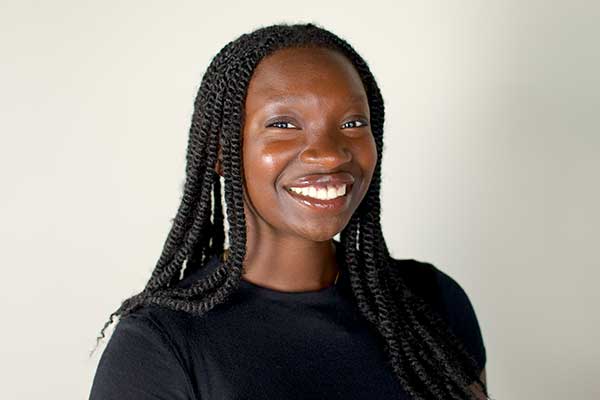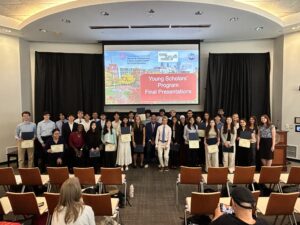From Young Scholars Program to Full-Time Student

While in high school, Dmitra Mukasa, E’28, bioengineering, participated in the Young Scholars’ Program offered by Northeastern. There, she learned about Northeastern’s impactful research and vast array of career opportunities available to its students, sparking her interest in attending the school. Now, in her second year of undergraduate studies, Mukasa has found a degree path that encapsulates all her interests and aspirations, making her excited to continue the journey.
In middle school, Dmitra Mukasa took part in a pre-med program her school offered. That program spurred Mukasa’s fascination with the medical field and her love of hands-on learning opportunities. Studying bioengineering seemed like the perfect fit for Mukasa, affording her the opportunity to combine her varied interests into one field where she would be able to improve the medical industry by developing and innovating new technologies. With an impressive bioengineering program, Northeastern University additionally stood out to Mukasa because of its co-op program; she wanted a college experience that would offer as many hands-on and technical learning experiences as possible.

Mukasa and her fellow students in the Young Scholars Program.
What further cemented Mukasa’s decision to study at Northeastern was her experience in the Young Scholars Program during the summer before her senior year of high school. The Young Scholars Program at Northeastern offers rising seniors in high school, who are Massachusetts residents, a chance to explore the STEM field. During this program, Mukasa participated in two different extensive research projects. One project was focused on the effects of pregnancy on the tricuspid valve, and the other project centered around contact forces on combat helmets. Inspired by these projects and all she was exposed to in the program, Mukasa was affirmed in her determination to attend Northeastern.
Mukasa has a unique adjunct to her engineering degree. She is currently on the pre-law path, taking law-related classes alongside her engineering courses. With her additional interest in law, Mukasa hopes to one day develop innovative medical technology, and she believes having a background in patent and copyright law will help her excel in her future career. She thinks law and engineering complement each other well, as they are both subjects that require a lot of analytical thinking and problem-solving. Mukasa enjoys being able to bridge the two subjects together for a well-rounded education.
Classroom Experiences
Mukasa has recently started her second year of undergraduate studies. So far, she has found her courses engaging, and there are a few that stand out to her. “Quantitative Physiology for Bioengineers” and “Bioengineering Measurement, Experimentation, and Statistics” have been Mukasa’s favorites. She said she found these classes interesting because they clearly illustrate the integration of engineering and biology, as well as the basics of how engineers tackle problems.
Mukasa also appreciated the tools that the engineering foundational courses, “Cornerstone of Engineering 1” and “Cornerstone of Engineering 2”, afforded her. She took her first Cornerstone course with Associate Teaching Professor Angelina Jay and said Professor Jay was extremely helpful throughout the course. In both Cornerstone classes, students are tasked with developing a theme-based project to strengthen their engineering abilities. During the first course, Mukasa’s theme was “engineering failures” and her group made a carnival game based on the high striker game, where someone hits one side of a lever with a hammer to try to move a piece resting on the other side of the lever upward with enough force to ring the bell at the top. They compared this to electrical outputs and how overflows of electricity can cause disruptions. If the hammer’s strike moves the piece within a certain range, it would mean the electrical output was stable. If the force moved the piece too high, the overflow of electricity would overload the system and cause everything to crash. If the force on the piece was too weak, then the electrical output would also be too weak to maintain the game.
For her second Cornerstone course, Mukasa and her group were tasked with taking everyday tasks and gamifying them. The everyday task her group focused on was someone taking pills; the idea was they would connect the pill case to a phone where people could send messages that you could read on the actual pill case once the person finished taking their pills. The pill case would have a light that would appear green while there were pills in it and turn red once the case was empty, as well as a streak counter that would increase each week if the pill case were finished and refilled.
Extracurriculars
Mukasa is a part of the student organization, Black Engineering Student Society (BESS), which is Northeastern’s chapter of the National Society for Black Engineers (NSBE). BESS hosts many networking and career development events for its members. Mukasa said she loves being a part of BESS because “You’re just with like-minded people all going through similar stuff, like looking for co-op around the same time. Having a community like this is always great.” BESS hosts a lot of resumé workshops and mock interview sessions that help prepare its members for their future career endeavors. They also host events with industry partners, like Dell, so their members can network with members of the potential employers. In addition, Mukasa said that the club puts on other non-career or engineering events that are equally exciting and allow all the members to get to know each other.
Future Perspectives
After completing her bachelor’s degree in bioengineering, Mukasa would like to complete a master’s degree through Northeastern’s PlusOne program. Currently, Mukasa is applying to co-ops for the first time, and she is excited to embark on this journey. She said she loves that Northeastern provides its students with a vast array of employers and co-op positions. “There is a lot of room to explore and many possibilities to take advantage of,” says Mukasa, as she is open to anything but can envision herself working in an engineering firm, tackling difficult problems in collaboration with a team of people. She is also interested in assisting with the development of medical prosthetics and collaborating with clients to assess how to improve the device. According to her, the possibilities are endless.